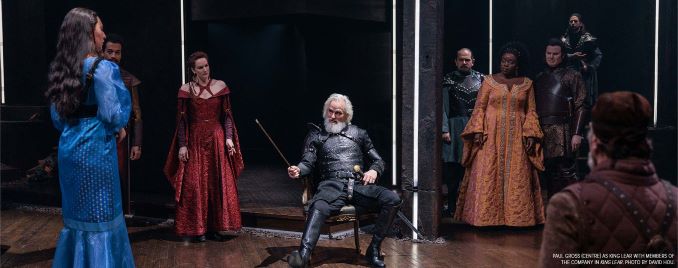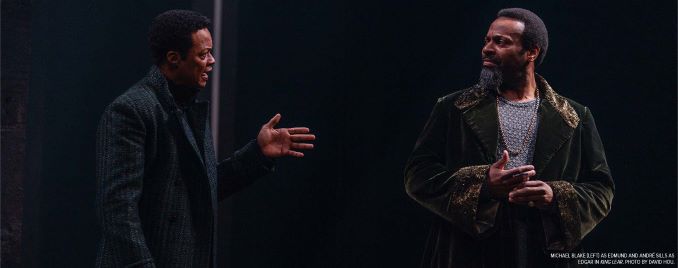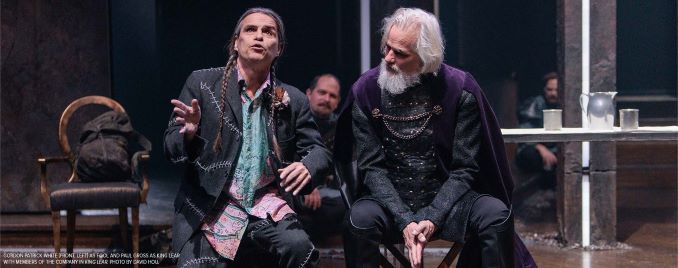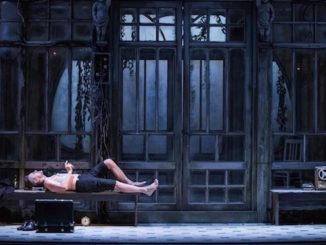Nearly twenty years ago, Paul Gross starred in what many consider the greatest Canadian television series of all time.
The brilliant, hilarious Slings & Arrows, which ran from 2003-2006, followed the trials and tribulations of a Stratford-like theatre festival, centering on the seemingly irreconcilable tensions between art (as exemplified by its Artistic Director, played by Gross) and commerce (as exemplified by Mark McKinney, as its business manager). Lovingly satirizing the artists, business types, and audience in equal measure, Slings & Arrows was at its best when it made light of the inflated egos of self-declared capital-A Artists.
All of which is to say that if Paul Gross isn’t careful, he’s on track to become that which he once parodied. Gross’s performance in Stratford’s current production of King Lear, while not quite on the level of chewing scenery, is decidedly not his best work. Paired with some shoddy direction (and even worse performances from key co-stars), this Lear nearly spins out of control, though a few saving graces – including strong production design and the better parts of Gross’s performance – make it deserving of some, qualified praise.

Those challenges begin with the very first scene, in which Lear’s frustration with his youngest daughter, Cordelia, for failing to adequately proclaim her love for him, fails to acknowledge how, in that very scene, she delivers as eloquent a description of filial love as ever uttered:
Why have my sisters husbands, if they say
They love you all? Haply, when I shall wed,
That lord whose hand must take my plight shall carry
Half my love with him, half my care and duty:
Sure, I shall never marry like my sisters,
To love my father all.
Even if we accept Cordelia’s pledge – “I can’t marry, because no husband could ever replace my love for my father” – as insufficient, it’s still hard to follow Lear’s next course of action, which is to on-the-spot disinherit her. (Hilariously, in what must surely be one of the earliest depictions of gold-digging, one of her suitors immediately abandons his romantic pursuit.)
The oddities don’t stop there. There’s the inexplicable disappearance of Lear’s Fool, who simply vanishes halfway through the play. There’s the strange decision to have a major late-play revelation occur off-stage, between scenes.
Honestly, probably the toughest part of Lear is the how – and the when – of how to depict Lear’s descent into madness. If the king is played as mad from the start, it’s a play about someone who’s already so lost that it’s hard to condemn him. But if the madness comes too late, it’s the story of a cruel, arbitrary man who is vindictive for the sake of it.
And then there’s the question of its central disagreement: not the one between Lear and Cordelia (she accepts her fate with relative grace), but between Lear and his other two daughters. It’s easy for audiences to miss – as they assuredly did in this production – the fact that Lear is mainly upset because Goneril and Regan have banished his retinue of a hundred, noisy, drunken, carousing knights. This disagreement lies at the heart of Lear, pitting an elderly man’s pride – we can understand why Lear is upset to lose his entourage – against his daughters’ reasonable expectation to not have their homes turned into a 24-7 frat party.

As a reminder, Lear is the tale of a very, very bad case of succession blues. King Lear is old, and self-aware enough to begin plans for the passing of his kingdom to his three daughters. But first, he wants each to describe the extent of their love for him. Goneril and Regan, the two elder daughters – more self-interested, more disingenuous – make hyperbolic declarations, winning Lear over at the expense of their younger sister, Cordelia. But when those same elder daughters anger Lear barely a scene later, the king quickly finds himself on the outs with everyone he cares about – quite literally, out in the cold. All the while, Edmund, bastard son of the Earl of Gloucester, is putting plans in motion to usurp his older brother’s inheritance, and emerge as the major power-player in the kingdom.
Unfortunately, the direction does a poor job of translating Shakespeare’s text into action. Gross’s Lear is, for the most part, a sarcastic jerk: sometimes it works well (as when he justifiably pushes back against Goneril’s and Regan’s power moves); other times, it makes him deeply unsympathetic (as when he meets and ostensibly befriends the disguised Edgar, outcast brother of Edmund). Gross doesn’t get much help from his immediate family, with Déjah Dixon-Green as Regan and Tara Sky as Cordelia giving particularly weak performances. Both are guilty of melodramatically uttering – no, declaiming – their lines in a style I haven’t seen since my high school production of Hamlet.
That said, the rest of the company is quite good, even excellent. Shannon Taylor as the third daughter, Goneril, does a brilliant job portraying the shift from justifiable frustration (how would you feel if someone brought a hundred drunken bros to your house?) to abject cruelty (the eyes!). Gordon Patrick White is also fantastic as he navigates the delicate balance between insightfulness and tomfoolery required of The Fool. Sometimes, his Fool is silly just for the sake of it; other times, behind his twinkling eyes we see that White/The Fool has a better grasp of what’s going on than nearly anyone else:
I marvel what kin thou and thy daughters are:
they’ll have me whipped for speaking true, thou’lt
have me whipped for lying; and sometimes I am
whipped for holding my peace.
Anthony Santiago is similarly wonderful as the ill-fated Earl of Gloucester; commanding when he needs to be, heartbreaking once events overtake him. André Sills as his son and would-be successor Edgar is also fantastic, managing the unenviable transition from proud son to self-abased outcast when forced into hiding. Even Michael Blake’s Edmund is, dare I say it, sympathetic as the bastard son so tired of ill-treatment that you almost understand his devilish machinations (which, to be fair, result in a lot of bloodshed).

For every great Gross moment, like his altogether excellent handling of the mad/storm scene, there’s another in which he plays Lear’s madness so broadly it elicits inappropriate audience laughter. Plus, thanks to poor direction which doesn’t make it clear why Lear is upset from the start, it’s also hard to understand what follows: why is he banished from Goneril’s house? Why does he immediately turn on both Goneril and Regan so soon after declaring them his successors? I know the answers to these questions because I know the play, but there’s little on stage at the Festival Theatre which conveys Shakespeare’s intent.
On the other hand, this Lear is a lot of fun to look at. The mostly traditional costumes are great, especially when characters don armour and go into battle. The stage, with its myriad doors and stairways, conveys a sense of space, as if there really is a castle somewhere in the backstage shadows. The famous storm scene, though lacking in actual rainfall – when I saw Ian McKellen play Lear, he got absolutely drenched – deploys enough theatrical tricks to convey the formidable nature of the “tempest” described in Shakespeare’s text.
And the finale, while abrupt – I think it’s really hard to stage a good Lear finale – finally gives us the Gross Lear we’ve been hoping for: broken, confused, and overwhelmed. This, in the end is a good Lear, a man who we can feel for. It’s just not a great Lear.
***
King Lear runs until October 29 at the Stratford Festival. Tickets for Lear and all things Stratford are available here.



